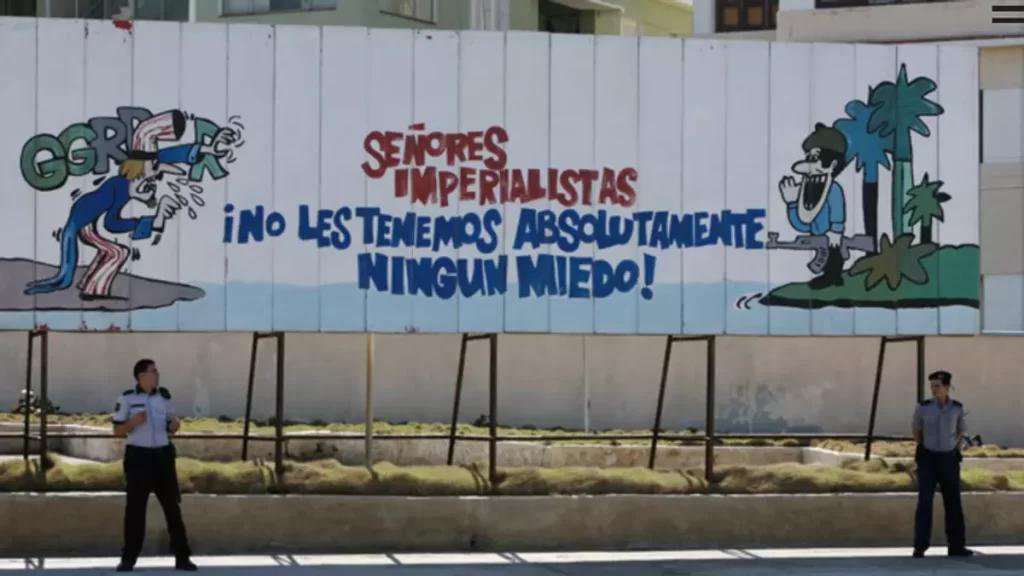
![]() Yunior García Aguilera, Madrid, 29 February 29 — On February 21, an article appeared in El Ciudadano , under the long and boring title The network of interference against Cuba, which goes from the United States to Spain, passing through Mexico. Although the Chilean media declares itself committed to human rights and democracy, it had no qualms about offering its space for a publication conceived from the very headquarters of the Cuban State Security, enforcer and guardian of authoritarianism on the Island.
Yunior García Aguilera, Madrid, 29 February 29 — On February 21, an article appeared in El Ciudadano , under the long and boring title The network of interference against Cuba, which goes from the United States to Spain, passing through Mexico. Although the Chilean media declares itself committed to human rights and democracy, it had no qualms about offering its space for a publication conceived from the very headquarters of the Cuban State Security, enforcer and guardian of authoritarianism on the Island.
Neither quick nor lazy, Granma, Cubadebate and their entire queue of replicating media echoed a soap opera loaded with conspiracy intrigues, data manipulated to avoid burning their sources, typical phrases from the Cuban propaganda and repressive repertoire, a lot of misogyny and overwhelming lies. They have turned the presentation of a book in Madrid into a whole plot of CIA operations, coups d’état and violent actions.
If it had been a script, Netflix would have rejected it immediately, for being bland and lacking in drama
If it had been a script, Netflix would have rejected it immediately, as bland and lacking in drama, but the network at the service of totalitarianism is running out of content and needs to generate noise. The orders come from Cuba, Venezuela provides the money and the person in charge of signing the pamphlet is a well-known Castro-Chavism operator, the pro-ETA Katu Arkonada.
The publication would be laughable if it weren’t for the fact that it exposes women who live in Cuba, a country with more than 1,000 political prisoners. The article could serve as a prelude to new arbitrary arrests, more repression, prohibitions on entering or leaving the country, as well as years in prison for the simple crime of daring to think differently from what the single party dictates.
The comments at the bottom of the post are even worse. In Granma , a user named Enrique Rodríguez suggests that “those worms (…) not be allowed to return to Cuba.” In Cubadebate, another reader named Rafa says that they can count on him for “total war, inside and outside the country,” and closes with a threat: “Don’t let a worm get in my way here in Spain.”
The article in question also mentions me in one of its paragraphs, describing me as “one of the most strident and violent Cuban dissidents.” It seems that, in the eyes of the regime, a simple white rose has more uranium and plutonium than weapons of mass destruction.
But, ultimately, who is Katu, the individual who puts his signature on the article? His real name is Israel Arconada Gómez, a Basque born in 1978. Although his communist parents encouraged him to study Economic Sciences, what fascinated the boy was politics, and he became at 16 a kind of “little Nicolás” of the ultra-left. He was arrested in 1998 for his links with groups involved in vandalism and terrorist acts. So, at just 19 years of age, he managed to leave for Cuba. It was then, presumably, that Cuban intelligence began using him. The young man stopped using his real name, assuming Katu as an alias, and changing the “c” to a “k” in his last name.
In 2003 he was sent, obviously, to Venezuela. From there he became coordinator of the World Social Forum in Brazil. In 2009 he made the leap to Bolivia, where he became nationalized and held high positions as a whisperer to Evo Morales. But Israel or, rather, Katu, found enemies even within its own nationalist ranks. He then went to Mexico, seeking new sponsors, until he got as close as he could to the ear of López Obrador.
Several women, like the Mexican journalist Karina Velasco, reported having been victims of this character
His blatant interference in Mexican internal affairs generated the collection of more than 1,500 signatures to request his expulsion from the country. Furthermore, the Castro-Chavista operator was implicated in several scandals for believing himself unpunishable and showing his other side of: that of a sexual harasser. Several women, like the Mexican journalist Karina Velasco, reported having been victims of this character.
That is why I am not surprised that a misogynist like Katu Arkonada exudes so much hatred in his article, especially against Cuban women. Nor is it surprising to me that a guy with a record so close to the ETA members accuses me of being “violent.” Anyone even remotely informed about my activism would laugh at Katu’s ignorance or audacity. Furthermore, how dare a guy with such an interventionist history talk about interference?
We already know that Cuban intelligence dedicated itself to forming and planting “katus” everywhere. But what do they want with this insubstantial article? What does Katu demonstrate, beyond the fear in the eyes of a dying regime?
____________
COLLABORATE WITH OUR WORK: The 14ymedio team is committed to practicing serious journalism that reflects Cuba’s reality in all its depth. Thank you for joining us on this long journey. We invite you to continue supporting us by becoming a member of 14ymedio now. Together we can continue transforming journalism in Cuba.
